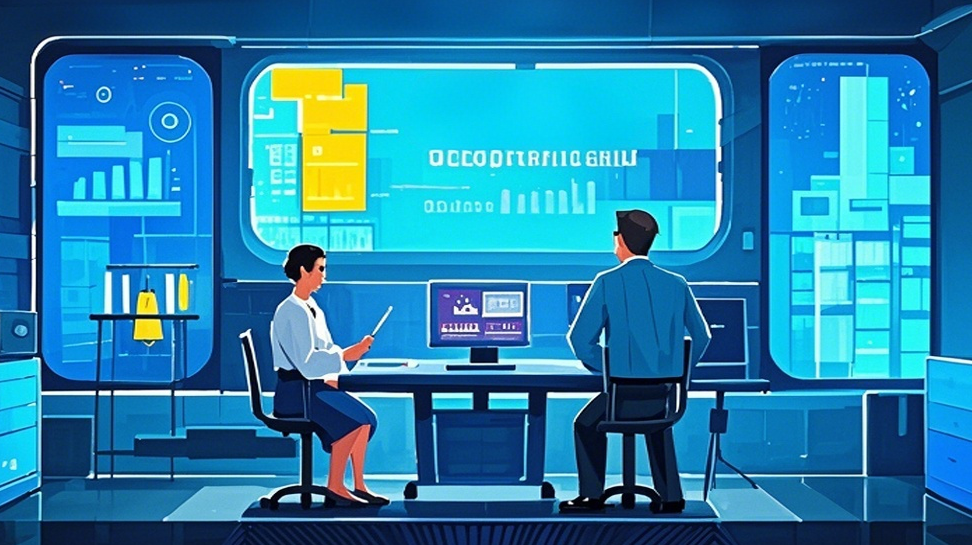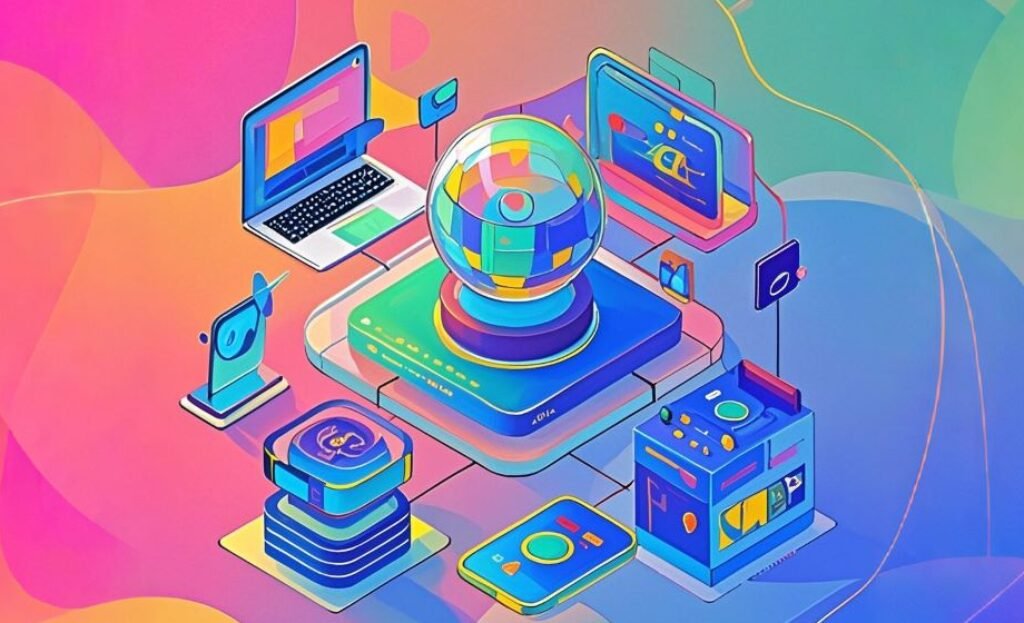
Introduction
AI (Artificial Intelligence) is changing the way we use technology in our daily lives. It’s making our digital assistants smarter and changing how entire industries work. Looking ahead to 2024, AI will keep growing and bringing new improvements that will affect our future.
This post will show you what’s new in AI for 2024. We’ll look at improvements in how AI works, including better ways for machines to learn and process information. We’ll also show you how AI is helping in real life – in healthcare, self-driving cars, banking, and how computers understand human language.
We’ll also talk about important safety and fairness issues as AI becomes more common in our lives. This includes making sure AI treats everyone fairly and protects people’s private information.
We’ll explore new developments in AI technology, including new types of computers that could make AI even more powerful. Finally, we’ll look at what AI might be like in the future and how it could affect our daily lives.
After reading this post, you’ll understand where AI stands in 2024, what new developments are happening, and what exciting possibilities lie ahead. Join us as we explore how AI will continue to change our world.

Advancements in AI Algorithms and Models
AI has always been about pushing the limits of what machines can do, and 2024 is no different. This year, we are seeing some exciting advancements in AI algorithms and models that promise to make a significant impact across various industries.
Enhanced Machine Learning Techniques
Machine learning is the backbone of many AI applications. In 2024, we’re witnessing some groundbreaking improvements in this area. New machine learning algorithms have been developed that are faster and more efficient, allowing models to learn from data quicker and with higher accuracy. This means better performance for applications like image recognition, recommendation systems, and predictive analytics.
Breakthroughs in Neural Networks
Deep learning, a subset of machine learning, relies heavily on neural networks that mimic the human brain. This year, we’ve seen remarkable breakthroughs in neural network architectures. Novel designs, such as Transformer models, are becoming even more powerful and versatile. These enhancements allow for more complex tasks, like understanding natural language and generating realistic images, to be performed with greater precision and less computational power.
Reinforcement Learning Evolution
Reinforcement learning, where models learn by interacting with their environment and receiving feedback, has also evolved significantly. Advances in this field are enabling AI systems to achieve higher levels of autonomy and efficiency. For example, robots are getting better at navigating complex environments and decision-making processes are becoming more applicable to real-world scenarios, such as autonomous driving and dynamic resource management.
These advancements in AI algorithms and models in 2024 are setting the stage for more intelligent and capable systems. As technology continues to progress, we can expect these AI-driven innovations to play an increasingly integral role in our everyday lives and in shaping the future of various industries.

Application Areas with Major Progress
AI continues to make incredible strides across various sectors in 2024. Here are some of the key areas where we’re seeing significant progress:
Healthcare
AI is making healthcare better and more personal. In 2024, AI helps doctors in two main ways:
First, AI can look at medical images (like X-rays and scans) better than ever. This helps doctors find diseases like cancer earlier, when they’re easier to treat.
Second, AI helps make treatment more personal. It can predict which medicines will work best for each patient by looking at their genes. This means doctors can choose the right treatment for each person.
Doctors are already using AI systems that look through lots of medical information to help them make better decisions about patient care.
Autonomous Vehicles
Self-driving cars are no longer a distant dream; they are becoming a reality thanks to AI. In 2024, AI has significantly improved the safety and reliability of autonomous vehicles. These advancements include better sensors, more sophisticated algorithms for decision-making, and enhanced ability to navigate through complex urban environments. Regulatory bodies are also catching up, with new laws being implemented to govern autonomous driving, enabling real-world testing and deployment.
Finance and Economy
Banks and financial companies are using AI in new ways to make their services better. AI helps them in several important ways:
First, AI can look at huge amounts of financial data to predict how markets might change. This helps investors and companies make better decisions about their money.
Second, AI is getting better at spotting fraud. When someone tries to steal money or make fake transactions, AI can quickly notice and stop it, keeping people’s money safe.
Finally, AI is making banking more personal and easier to use. It helps with things like:
• Answering customer questions automatically
• Deciding who should get loans
• Giving advice about investments
Natural Language Processing (NLP)
In 2024, computers are getting much better at understanding and using human language – this is called Natural Language Processing (NLP). AI can now understand what people say and write more clearly than before. This means:
• Translation tools can better change text from one language to another, helping people around the world talk to each other more easily
• AI assistants and chatbots are becoming friendlier and more helpful – they can understand what you mean and give better answers
• Customer service is improving with AI that can understand customer problems better and help solve them right away, just like talking to a real person.
As we’ve seen, AI is making big changes in many different areas of our lives. Throughout 2024, AI will keep getting better and will help make our daily lives and work easier in many ways. Whether it’s in healthcare, driving, banking, or how we communicate, AI is becoming an important tool that helps make things better for everyone.

Ethical and Regulatory Considerations
As AI keeps growing faster and faster, it’s becoming more important to make sure it’s used in the right way. In 2024, we need to focus on two main things: making sure AI is safe, and creating good rules for how to use it. This will help people trust and accept AI technology more easily. Let’s look at the key things we need to think about:
Addressing Bias and Fairness in AI
One of the major ethical concerns in AI is bias. AI systems can sometimes make decisions that unfairly discriminate against certain groups. In 2024, significant efforts are being made to address this issue. Developers are working to improve the fairness of AI algorithms by ensuring diverse and representative data is used during training. Techniques like bias mitigation and fairness auditing are becoming standard practice to identify and correct biases in AI models.
Privacy and Data Protection Enhancements
AI relies heavily on data, which raises concerns about privacy and data protection. With stricter regulations in place, such as the General Data Protection Regulation (GDPR) in Europe, 2024 sees more robust measures being adopted globally to safeguard personal information. AI developers are now implementing techniques like differential privacy and secure multi-party computation to ensure that sensitive data remains confidential and secure while still enabling AI functionalities.
Transparency and Explainability
Another critical ethical consideration is the transparency and explainability of AI systems. Users and stakeholders need to understand how AI makes decisions, especially in high-stakes areas like healthcare and finance. In 2024, there is a strong push for AI models to be more interpretable. Techniques such as model explainability tools and transparent algorithms are helping users gain insights into AI decision-making processes, fostering trust and accountability.
Regulatory Compliance
Regulatory bodies around the world are catching up with AI advancements to establish guidelines and standards. In 2024, new regulations are being introduced to ensure ethical AI development and deployment. These include rules governing data usage, algorithmic accountability, and the certification of AI systems. Companies are investing in compliance and ethical AI practices to meet these regulatory requirements, ensuring their technologies are lawful and ethical.
Ethical AI Use Cases
Beyond regulations, there’s a growing emphasis on using AI for socially beneficial purposes. Ethical AI initiatives are being launched to tackle global challenges such as climate change, education, and healthcare accessibility. By prioritizing these ethical use cases, AI developers aim to create technology that not only complies with regulations but also contributes positively to society.
As we navigate through 2024, addressing these ethical and regulatory considerations is essential for building trust in AI systems. By focusing on fairness, privacy, transparency, compliance, and ethical applications, the tech community is striving to create AI technologies that are both innovative and responsible.
AI Hardware and Infrastructure Innovations
Quantum Computing and AI
Quantum computing is a new type of computing that could make AI much better. Unlike regular computers that use regular bits (1s and 0s), quantum computers use special bits called qubits. These qubits help quantum computers work much faster when dealing with large amounts of information. Right now, scientists are testing how quantum computers can help AI work better, like making AI programs run faster and make smarter decisions.
Neuromorphic Computing
Scientists are creating computer chips that work like the human brain. These special chips, called neuromorphic chips, process information in a way that’s similar to how brain cells work. This new technology has two big advantages: it uses less power and works faster than regular computer chips. Because of these benefits, these chips are perfect for robots and other devices that need to process information quickly.
Edge AI Developments
Edge AI is a new way of making computers and devices smarter by having them process information right where they are, instead of sending data to big computer centers far away. Think of it like having a tiny brain in your device that can make decisions on its own. This makes things work faster and uses less internet data.
For example, when self-driving cars or smart home devices need to make quick decisions, they can do it right away without waiting for information to travel back and forth to distant computers. This means they work better and faster.
New improvements in Edge AI technology mean that devices can now run more powerful AI programs by themselves. This not only makes them work better but also keeps your information more private and secure because the data stays on your device.
As companies invest in new and better computer hardware, AI will be able to do more things and work better than ever before. This will help solve current problems and create new opportunities in many different fields.
Future Outlook and Predictions
Integration into Daily Life
By the end of 2024, AI is expected to be seamlessly integrated into our daily lives. We will see smart home devices becoming even more intuitive, with AI managing tasks like energy usage and security automatically. In consumer technology, products powered by AI will provide personalized experiences, such as virtual assistants that learn user preferences and improve over time.
Long-term AI Trends
As we look past 2024, AI will keep growing and changing our world. This brings both good things and new challenges. More people want AI to be fair and open about how it works, which means companies need to focus on making AI systems that everyone can trust. As AI gets better at doing complex jobs, it will change how we work. This means people will need to learn new skills to work alongside AI. Both companies and workers will need to get ready for these changes to stay successful.
In summary, the future of AI promises a more integrated and smarter world, but it will also require careful consideration of ethical implications and the adaptation of our workforce to thrive alongside this technology.
Conclusion
We’ve looked at all the new and exciting ways AI is changing in 2024. We covered how AI systems are getting better, how they’re being used in different areas of life, and why it’s important to use AI responsibly.
AI is becoming more powerful and will continue to make our lives easier and change how many businesses work. It’s important for all of us to keep learning about these changes and understand how they affect our world. By using AI in the right way and being careful about safety and fairness, we can make sure AI helps everyone.
Keep learning about AI – it’s an amazing time to see how this technology is changing our world!





